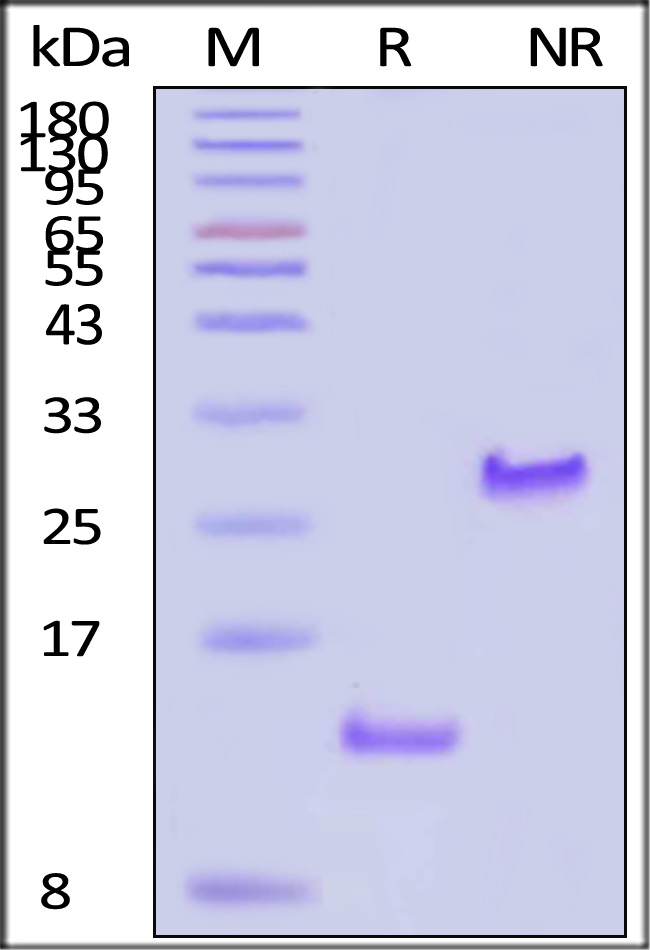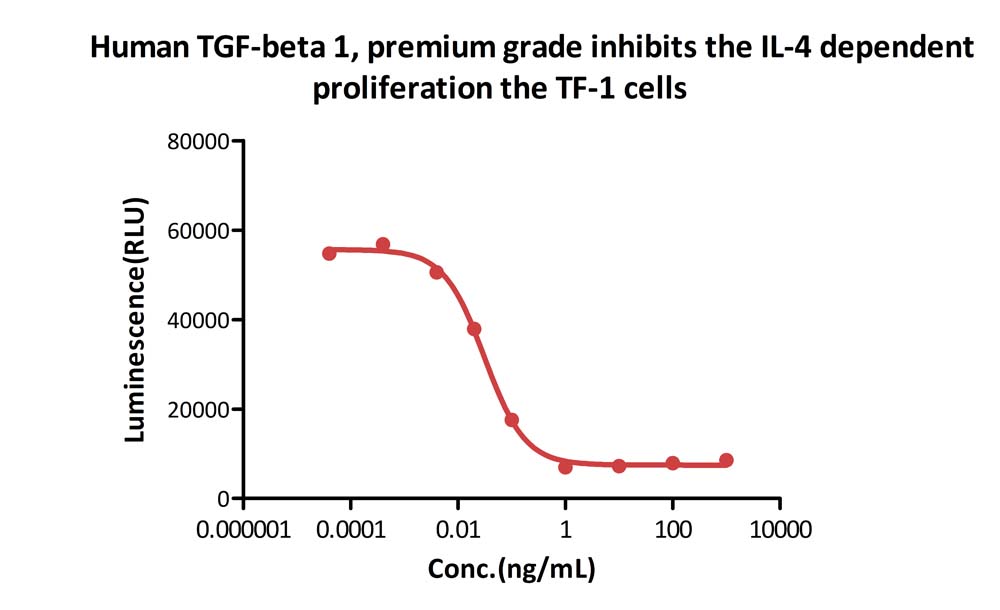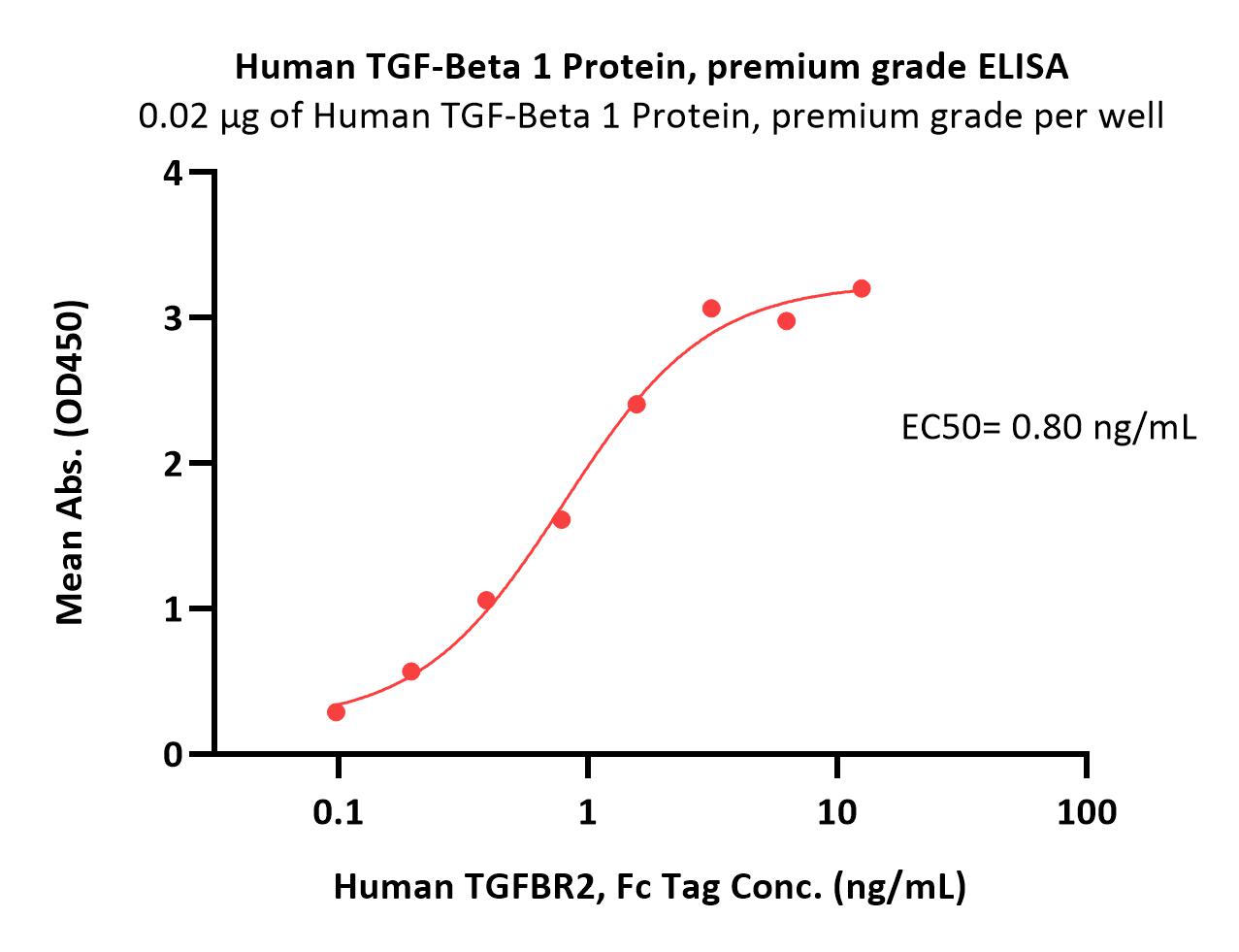分子别名(Synonym)
CEDLAP,TGF-beta 1,TGFB1,DPD1,TGF-beta-1,TGFB
表达区间及表达系统(Source)
Human TGF-Beta 1 Protein, premium grade (TG1-H5218) is expressed from human 293 cells (HEK293). It contains AA Ala 279 - Ser 390 (Accession # P01137-1).
Predicted N-terminus: Ala 279
It is produced under our rigorous quality control system that incorporates a comprehensive set of tests including sterility and endotoxin tests. Product performance is carefully validated and tested for compatibility for cell culture use or any other applications in the early preclinical stage.
GMP-TG1H25 is the GMP version of this TG1-H5218. These two proteins display indistinguishable performance profiles, thereby ensuring a seamless transition for end users from early preclinical stag to later clinical phases.
Request for sequence
蛋白结构(Molecular Characterization)

This protein carries no "tag".
The protein has a calculated MW of 12.8 kDa. The protein migrates as 13 kDa±3 kDa under reducing (R) condition, and 28 kDa when calibrated against Star Ribbon Pre-stained Protein Marker under non-reducing (NR) condition (SDS-PAGE).
内毒素(Endotoxin)
Less than 0.01 EU per μg by the LAL method.
宿主蛋白残留(Host Cell Protein)
<0.5 ng/µg of protein tested by ELISA.
宿主核酸残留(Host Cell DNA)
<0.02 ng/μg of protein tested by qPCR.
无菌(Sterility)
Negative
支原体(Mycoplasma)
Negative.
纯度(Purity)
>95% as determined by SDS-PAGE.
制剂(Formulation)
Lyophilized from 0.22 μm filtered solution in 100 mM HAC, pH3.0 with trehalose as protectant.
Contact us for customized product form or formulation.
重构方法(Reconstitution)
Please see Certificate of Analysis for specific instructions.
For best performance, we strongly recommend you to follow the reconstitution protocol provided in the CoA.
存储(Storage)
For long term storage, the product should be stored at lyophilized state at -20°C or lower.
Please avoid repeated freeze-thaw cycles.
This product is stable after storage at:
- -20°C to -70°C for 24 months in lyophilized state;
- -70°C for 3 months under sterile conditions after reconstitution.
电泳(SDS-PAGE)

Human TGF-Beta 1 Protein, premium grade on SDS-PAGE under reducing (R) and non-reducing (NR) conditions. The gel was stained with Coomassie Blue. The purity of the protein is greater than 95% (With Star Ribbon Pre-stained Protein Marker).
活性(Bioactivity)-CELL BASE

Human TGF-beta 1, premium grade (Cat. No. TG1-H5218) inhibits the Human IL-4, premium grade (Cat. No. IL4-H4218) dependent proliferation the TF-1 cells. The specific activity of Human TGF-beta 1, premium grade is > 6.00ⅹ10^6 IU/mg, which is calibrated against transforming growth factor β1 (NIBSC code:89/514) (QC tested).
Protocol
活性(Bioactivity)-ELISA

Immobilized Human TGF-Beta 1 Protein, premium grade (Cat. No. TG1-H5218) at 0.2 μg/mL (100 μL/well) can bind Human TGFBR2, Fc Tag (Cat. No. TG2-H5252) with a linear range of 0.097-3.125 ng/mL (QC tested).
Protocol
背景(Background)
This gene encodes a secreted ligand of the TGF-beta (transforming growth factor-beta) superfamily of proteins. Ligands of this family bind various TGF-beta receptors leading to recruitment and activation of SMAD family transcription factors that regulate gene expression. The encoded preproprotein is proteolytically processed to generate a latency-associated peptide (LAP) and a mature peptide, and is found in either a latent form composed of a mature peptide homodimer, a LAP homodimer, and a latent TGF-beta binding protein, or in an active form consisting solely of the mature peptide homodimer. The mature peptide may also form heterodimers with other TGFB family members. This encoded protein regulates cell proliferation, differentiation and growth, and can modulate expression and activation of other growth factors including interferon gamma and tumor necrosis factor alpha. This gene is frequently upregulated in tumor cells, and mutations in this gene result in Camurati-Engelmann disease. [provided by RefSeq, Aug 2016]























































 膜杰作
膜杰作 Star Staining
Star Staining












